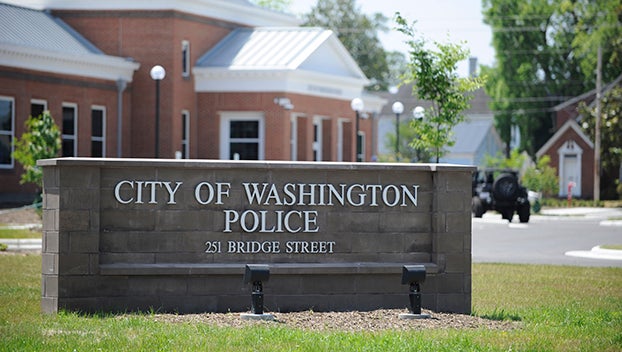On the road to a quick recovery
Published 12:11 am Tuesday, February 14, 2012

Joe Hofmann wiped down his truck on Tuesday afternoon at his Swan Point home just days after receiving a heart valve with a new procedure at the East Carolina Heart Institute. (WDN Photo/Betty Mitchell Gray)
Washington man returns to daily routine thanks to new heart valve procedure
On Tuesday afternoon, Joe Hofmann walked outside his Swan Point home and down the stairs to his driveway where he took a few minutes to wipe dust off of his red pickup truck, as he enjoys doing most days of the week.
This routine event would not have been so remarkable and warranted the attention of news media from Washington and Greenville except for the fact that just a few weeks ago, Hofmann, 85, could hardly dress himself or walk five steps without stopping to catch his breath.
Hofmann’s aortic valve — the valve in the heart that pumps blood from his heart into the aorta and, from there, throughout the body — was closing. But because of his age and other health problems, his doctors believed he would not survive traditional heart surgery.
Hofmann feared he would not live to see his 86th birthday on April 1.
“I could not walk five steps,” he said.
But his cardiologist, Dr. Mary Jo Bertsch, had heard of a new procedure being done at the East Carolina Heart Institute and referred Hofmann to doctors there.
And today, Hofmann is gradually returning to his daily routine of wiping down his truck, feeding his cats and walking to the mailbox thanks to a heart valve he received through that new procedure, known as a transcatheter aortic valve replacement, or TAVR.
“They gave me a new life, really,” Hofmann said in an interview with the Daily News at his home.
TAVR allows doctors to replace a worn aortic valve without opening a patient’s chest in open-heart surgery.
TAVR is considered less invasive than a traditional operation to replace a heart valve and is an option when patients are either not good candidates for open-heart surgery or might be considered too weak or too old to undergo it.
During TAVR, the new valve is inserted with a catheter through either an artery in the leg or by making a small incision in the chest and inserting the valve through the top of the left ventricle of the heart. The doctor implants the new valve and pushes back the old one.
TAVR “offers patients who are at extreme risk for surgery an option,” said Dr. Walter A. Tan in an interview with the Daily News. “Otherwise, they would be turned away.”
Tan is an interventional cardiologist and associate professor of cardiovascular sciences at ECU’s Brody School of Medicine and performed the surgery on Hofmann along with Dr. W. Randolph Chitwood Jr., director of the Heart Institute, and a team of surgeons.
“This is an important medical innovation. It is the future,” he said. “Many years ago, doctors could never fathom a valve replacement without opening the chest.”
Hofmann is one of the first patients in the state to benefit from the new surgery.
While the procedure has been performed in Europe since 2006, it is new to surgeons in the United States.
The first TAVR procedure in North Carolina was performed at Presbyterian Hospital in Charlotte earlier this year following approval by the U.S. Food and Drug Administration of the valve that is used in the surgery.
A team of ECU doctors performed the first TAVR at the East Carolina Heart Institute at Vidant Medical Center on Monday, Jan. 23.
That patient was one of two from eastern North Carolina who received a smaller replacement valve that is awaiting FDA approval as part of a clinical trial by local doctors, Tan said.
Hofmann underwent surgery a week later and received a valve that had already been approved by the FDA, Tan said.
He returned home on Friday, Feb. 3.
Benefits of the less-invasive procedure include faster recovery, less pain and fewer complications than are associated with traditional valve replacement surgeries.
TAVR “is rapidly becoming a routine procedure,” Tan said.
Hofmann and his wife, Doris, moved to Washington about 20 years ago from Jessup, Md., after he retired from a 43-year career with Davison Chemical Co., now W.R. Grace & Co. Hofmann underwent quadruple heart-bypass surgery in 1995 and suffers from pulmonary fibrosis.
While his doctors had concerns about the condition of his aortic valve for some time, Hofmann noticed that during the past six months, he “started going downhill” and his condition was getting “progressively worse.”
Today, Hofmann and his wife call his recovery “a miracle” and are thankful that he was offered the chance for the TAVR procedure.
“He would have died,” Doris Hofmann said. “There was no doubt about that. Open-heart surgery was not an option.”
Tan said Hofmann’s recovery has been remarkable. Like the other TAVR patients, he was immediately breathing better and was soon walking around the hospital better than before.
Said Hofmann: “I already feel my energy coming back. Give me another week and I’ll be running.”





